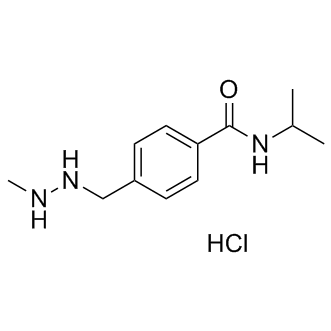All AbMole products are for research use only, cannot be used for human consumption.

Procarbazine hydrochloride (Matulane) is a hydrochloride salt form of procarbazine which is a polyfunctional alkylating compound used as an antineoplastic agent. Procarbazine is a cytostatic agent, meaning it strands cells midway through cell division, but it does not actively kill them. Procarbazine interferes with cells at a number of sites to prevent DNA and protein synthesis and mitosis. Procarbazine hydrochloride (Matulane) is used in the treatment of Hodgkin’s lymphoma and other malignant lymphomas including:- lymphosarcoma- reticulosarcoma- Brill-Symmers disease. Because procarbazine hydrochloride (Matulane) works differently to other anticancer agents,Procarbazine hydrochloride (Matulane) may be useful in the treatment of cancers that have not responded to other treatments.
| Molecular Weight | 257.76 |
| Formula | C12H19N3O.HCl |
| CAS Number | 366-70-1 |
| Solubility (25°C) | Water 50 mg/mL Ethanol 50mg/mL |
| Storage |
Powder -20°C 3 years ; 4°C 2 years In solvent -80°C 6 months ; -20°C 1 month |
[1] National Toxicology Program. Procarbazine and its hydrochloride
[2] No authors listed. Rep Carcinog. Procarbazine hydrochloride
[4] National Toxicology Program. Procarbazine hydrochloride
[5] No authors listed. IARC Monogr Eval Carcinog Risk Chem Hum. Procarbazine hydrochloride
| Related DNA/RNA Synthesis Products |
|---|
| AV-153 free base
AV-153 free base is an antimutagenic. AV-153 free base intercalates to DNA in a single strand break and reduces DNA damage, stimulates DNA repair in human cells in vitro. AV-153 free base interacts with thymine and cytosine and has an influence on poly(ADP)ribosylation. |
| Deoxyribonucleic Acid (from Salmon sperm)
Deoxyribonucleic Acid (from Salmon sperm) can be used as a research reagent, widely used in molecular biology, pharmacology and other scientific research. |
| GSK4418959
GSK4418959 (IDE275) is a non-covalent, reversible, selective and orally active WRN helicase inhibitor. GSK4418959 inhibits ATPase and DNA unwinding functions in an ATP-competitive manner. |
| Dencatistat
Dencatistat (P115) is an inhibitor of Cytidine Triphosphate Synthase 1 (CTPS1) with an IC50 value of ≤ 0.1 μM. |
| Antipain dihydrochloride
Antipain dihydrochloride is a protease inhibitor. Antipain dihydrochloride inhibits N-methyl-N'-nitro-N-nitrosoguanidine (MNNG)-induced transformation and increases chromosomal aberrations. Antipain dihydrochloride also restricts uterine DNA synthesis and function in mice. |
All AbMole products are for research use only, cannot be used for human consumption or veterinary use. We do not provide products or services to individuals. Please comply with the intended use and do not use AbMole products for any other purpose.


Products are for research use only. Not for human use. We do not sell to patients.
© Copyright 2010-2024 AbMole BioScience. All Rights Reserved.
